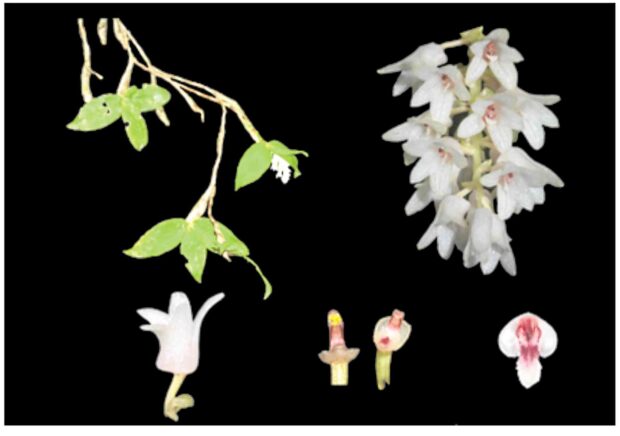New orchid species boosts forest protection drive in South Cotabato

CONSERVATION DRIVE Newly discovered Pinalia campanulata is among the close to 200 orchid species documented at the Allah Valley in South Cotabato. Its discovery is expected to boost efforts to include Allah Valley as part of the country’s system of integrated protected areas. —CONTRIBUTED PHOTO
KORONADAL CITY—A new orchid species has been discovered in the forests of southern Mindanao, boosting the case for declaring it as a protected area that will enhance biodiversity conservation measures there.
Biologists Kier Mitchel Pitogo, Aljohn Jay Saavedra and Ronny Boos discovered the species, Pinalia campanulata, in the Mount Busa Key Biodiversity Area (KBA), which straddles the provinces of Sarangani and South Cotabato.
“The new species was discovered growing on moss-covered tree trunks in the upper montane forest,” they wrote in a paper published on Wednesday in Phytotaxa, the world’s largest journal in botanical taxonomy.
Pitogo said they found the new orchid species in the KBA’s Allah Valley Protected Landscape (AVPL) in South Cotabato, in a mossy forest situated over 1,500 meters above sea level.
“It is the first orchid species to be described [as] from the Mt. Busa Key Biodiversity Area,” he told the Inquirer by email.
Article continues after this advertisementPitogo, who is pursuing his doctorate at the Department of Ecology and Evolutionary Biology in Kansas University, noted that as far as they know, it is the only orchid species of the genus Pinalia discovered in southern Mindanao.
Article continues after this advertisementThe discovery of the orchid species brings to 39 the total number of Pinalia in the Philippines, the authors wrote.
Features
The new orchid species is distinguished among the genus Pinalia by “its very short inflorescence that bears a few, closely spaced and relatively large campanulate flowers with trilobed, weakly keeled labellum and a dentate callus on disc,” the authors’ paper stated.
At 50 centimeters, Pinalia campanulata stands out with its distinctively bell-shaped or campanulate, crystal white flowers.
The orchid was initially sighted during a biodiversity monitoring in the AVPL site in 2021.
This new species was first observed flowering in August 2021 on the northern slope of the Busa mountain range in Lake Sebu, South Cotabato, and in April 2022 on the southern slope near Kiamba, Sarangani, the authors stated.
Preliminary classification by the authors designates the new species as “near threatened,” aligning with the criteria established by the International Union for Conservation of Nature, given the limited empirical field data available.
Field research
The Department of Environment and Natural Resources in Soccsksargen (South Cotabato, Cotabato, Sultan Kudarat, Sarangani, General Santos) said this recent discovery bolsters the ongoing process to include the AVPL as a full component of the National Integrated Protected Areas System, given the 185 orchid species found there, with Pinalia campanulata.adding to its diverse tapestry of flora.
On Aug. 9, House Bill No. 5291 or the Allah Valley Protected Landscape Act of 2021 passed first reading in the House of Representatives.
READ: Rare plant species named in honor of Philippine wildlife expert
The authors said their discovery of Pinalia campanulata showed the importance of continuously doing field-based research in the underexplored forests of southern Mindanao.
“It is among the least biologically explored regions in the Philippines, owing to logistical difficulty, security issues and bureaucracy that impede field work in the area,” they wrote.
They recommended more extensive surveys in the mountains of Busa, Malibato, Daguma, Kidapong, Matutum, Tampakan and Latian to address the knowledge shortfalls that limit full understanding of southern Mindanao’s biodiversity.